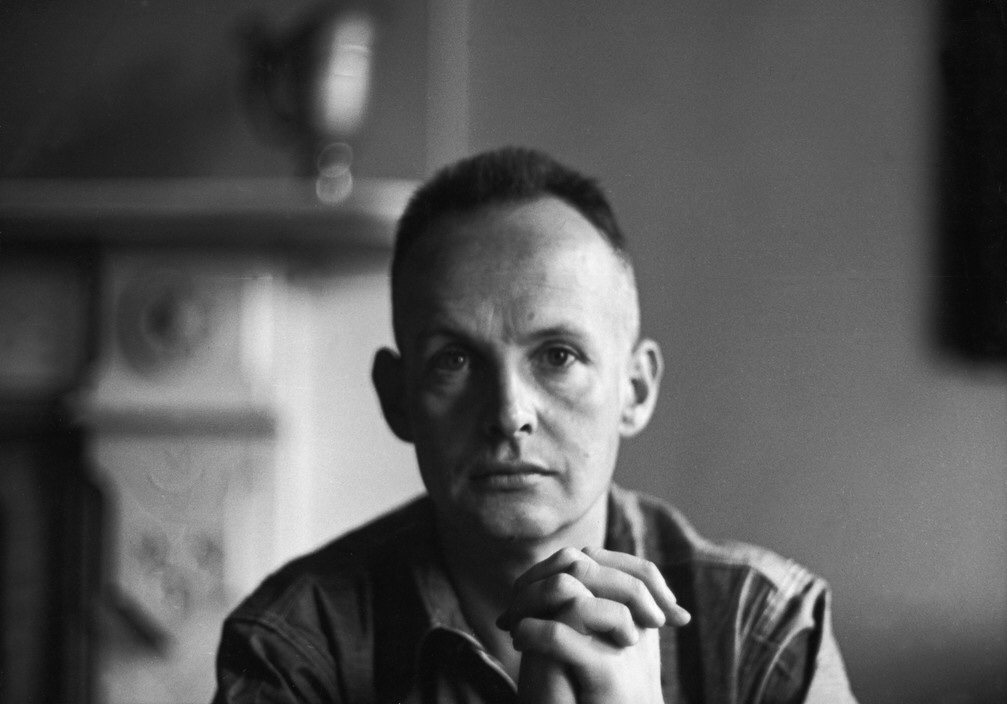Something very curious to me:
Why did HCB give up photography?
Some of my theories:
Did he just get bored?

No doubt. HCB was a photographic and artistic genius.
Did he give up photography because he just got bored? Did he feel that he pushed the limits of photography to the furthest bounds — and that there was nothing left? That painting was ultimately superior to photography?
Did HCB just want to be a painter?

Andre Breton Painting 
Henri Cartier-Bresson Nude Photograph
“For me the camera is a sketch book, an instrument of intuition and spontaneity, the master of the instant which, in visual terms, questions and decides simultaneously. In order to ‘give a meaning’ to the world, one has to feel oneself involved in what one frames through the viewfinder. This attitude requires concentration, a discipline of mind, sensitivity, and a sense of geometry – it is by great economy of means that one arrives at simplicity of expression.” – Henri Cartier-Bresson
HCB’s teacher was Andre Lhote (a great painter). I think initially it was HCB’s ambition to become a painter.
Furthermore, it seems that all of HCB’s friends were painters. There are TONS of photos HCB shot of Picasso, Balthus, and the sculptor Alberto Giacometti.
My theory:
Perhaps HCB was envious of the success of his great painter friends, and felt an inferiority bias being a photographer.
HCB as a surrealist.

Not only that, but HCB’s friends and those who inspired him were mainly ‘surrealists’. HCB spent a lot of time with Andre Breton, who wrote the surrealist manifesto.
If we look at HCB’s photos, you can see the strong surrealism in his images:

USA. NYC. 1959. TV programme “To Tell the Truth”, one of the numerous question and answer contests. This one is sponsored by a men’s shaving soap. 

YUGOSLAVIA. Serbia. Kraljevo. 1965. 

Mexique, 1934 

Texas. San Antonio. Aerospace Medical Center, run by US Air Force. Located at Brooks Air Force Base, center conducts experiments in simulated space flights. Base militaire de Brooks. Centre de médecine spatiale, dirigé par l’US Air Force. Vols spatiaux simulés. Expériences menées en apesanteur. 

FRANCE. Alpes-Maritimes. Saint-Jean-Cap-Ferrat. 1954. Spanish painter, Pablo PICASSO. 

JAPAN. Tokyo. Hibiya district. 1965. 
Was HCB trying to escape himself?
Another theory:
It seems that HCB despised the fact that he was born into privilege. He took on a lot of socialist/communist causes, even though he was the ultimate bougie individual.
Henri Cartier-Bresson was preaching from a position of ‘champagne socialism’ or ‘caviar socialism’. There is this anecdote that a friend of him was having a sumptuous meal together, talking about the problems of capitalism and wealth inequality, in which the meal cost “the working salary of a negro for 7 months” [roughly the quote of HCB’s friend].
Did HCB really think that painting was superior to photography?
I’ll make the bold statement:
I think photography is more interesting, challenging, and superior to painting.
Why? You’re dealing with reality. You don’t offend anyone when you’re painting; with street photography (and people photography), you do.
I almost think of painting more like zen meditation, whereas street photography is a combination of ‘pickup artist’ and UFC fighter. Street photography takes 1000x more courage than painting.
Conclusion: HCB lost courage
My simple conclusion is this:
- HCB failed to have the courage to assert that photography was as legitimate (or not more legitimate) than painting.
- HCB was a closet painting lover, and secretly hated the fact he was a photographer. Double pain is that he became extremely successful in photography. Thus he felt trapped by his own success.
- HCB should have had the courage to PUSH PHOTOGRAPHY FURTHER;; to not tie it to the analogy of painting. But to discover a NEW visual language via photography.
More thoughts to come.
ERIC

SPAIN. Madrid.
“A good photograph is made when the inner vision behind the closed eye corresponds with the vision of the open one behind the viewfinder in the moment of pressing the button.” – Henri Cartier-Bresson
Learn from the master, Henri Cartier-Bresson:
- Henri Cartier-Bresson Photography Philosophy
- Henri Cartier-Bresson Was a Master Surrealist Street Photographer
- 8 Inspirational Henri Cartier-Bresson Quotes on Photography, Composition, and Life
- Henri Cartier-Bresson Composition
- 5 Henri Cartier-Bresson Photography Composition Lessons
- 17 Lessons Henri Cartier-Bresson Has Taught Me About Street Photography
- Book Review: The Decisive Moment by Henri Cartier-Bresson
- 10 Things Henri Cartier-Bresson Can Teach You About Street Photography

